![]()
A cabaret performer and silent film actress during the Weimar years, Marlene Dietrich left Berlin at the dawn of the 1930s. She abandoned Germany, traveling to Hollywood with director Josef von Sternberg who'd go on to make Dietrich into Tinseltown's most glamorous star. The pair of creative partners and off-screen lovers shot seven films together, all of them classics whose sensuous allure and grotesque opulence make for some of the weirdest pictures to come out of Hollywood at the time. Theirs was a cinema of provocation, hedonistic spectacles that overwhelmed the senses even as they moved at a lethargic pace as if the films themselves are bodies recuperating in the aftermath of an orgasm. As an avowed fan of Marlene Dietrich, this septet represents some of my favorite flicks, their dreams of celluloid working as siren songs that never fail to seduce and enchant.
The Criterion Channel is now streaming these seven glistening gems, so it's a good time to explore a Sternberg-directed Dietrich performance that came palpably close to an Oscar nomination. Let's talk Lily in Shanghai Express…
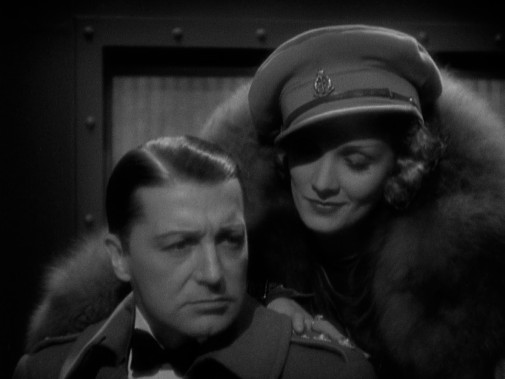
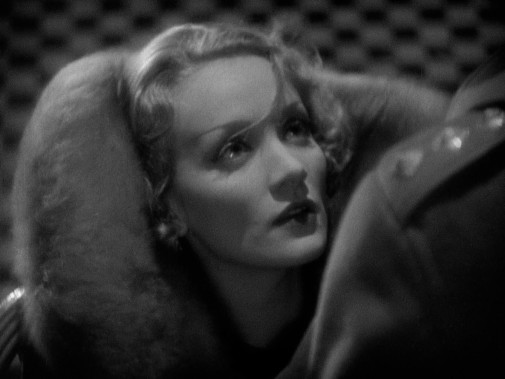
Befitting its main setting, Shanghai Express works as a train ride given cinematic form. It tells the story of a misadventure during the titular locomotive's travel when, in 1931, the train is stopped by Chinese officers in search of a rebel agent. The authorities fail to find the man and, later on, he reveals himself and sequesters his fellow passengers. Warlord Henry Chang is looking for someone important he can trade for a captured aide and he seems to find the prized prisoner in British Captain Donald Harvey. However, spoiling his plans, the beautiful courtesan Shanghai Lily offers herself instead of Harvey, wanting to protect the man who was once her lover. Blackmail, rape, and murder take place in this tale before a happy ending arrives, the final destination of a nightmare trip.
All this plot notwithstanding, Shanghai Express is quite short, running only 82 minutes. Its pace is not necessarily quick, though. More than even the usual languidness of the Sternberg-Dietrich films, this gorgeous dream of celluloid feels like it lives in the liminal space between waking life and unconsciousness. The lull of the train's movement is hypnotizing, its constant sound as narcotizing as the constant dissolves that take the melodrama of the plot to extremes of poetic abstraction. Watching Shanghai Express is to be given a kiss of inebriation, to lose oneself in silvery images and seducing glances, dreams of glamour, blood, smoke. Sternberg even directed his actors according to an idea of cinema as a half-dream on a locomotive. He wanted his actors to talk like a train, their speech deliberately delivered in a monotone. In other words, he looked in the face of naturalism, spat on it and encouraged the cast to do the same.
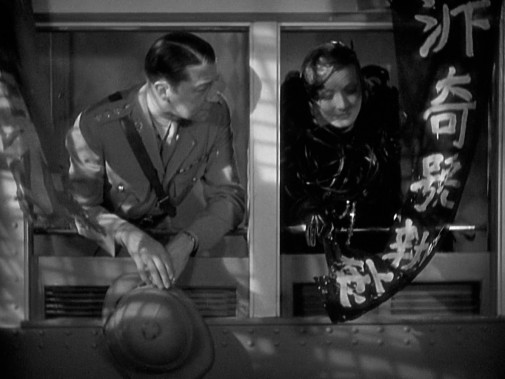
None of Sternberg's chosen thespians takes to this approach quite as perfectly as Dietrich. Some ungenerous viewers might characterize what she does as little more than a collection of artful poses but one shouldn't go around thinking that such a thing is a necessarily bad strategy to film acting. Despite doing much more than just posing, Dietrich's relationship to the camera and the studio lights is its own kind of love story, a romantic dance that's perfectly calculated but never comes off as self-conscious. Early on, when disclosing her new moniker to Harvey, the way Dietrich refuses to look at the man, how her hand elegantly fiddles with a banner, evokes a strange feeling of melancholy, the want for what she cannot have. It's a gesture that indicates confidence infused with studied aloofness, manipulation with a ring of honesty, a lie that speaks the truth.
With little more than a tilt of the head and slight movement of the gloved hand, the actress has created a delicate mood and defined how we should approach this film and character. She illuminates their heady mix of sensuality and yearning, glowing light undercut by deep shadows. It's not close to how people behave off-screen, not at all. However, even as it's far from reality, it has value. The imitation of real life isn't the only way to make art and there's a craft in the overt artifice. Just notice the way Dietrich handles Travis Banton's luxurious costumes and the script's bouts of humor. The costumes never wear her, their filigreed glitz expertly used by the actress to draw attention to her every motion, her precise slinkiness.
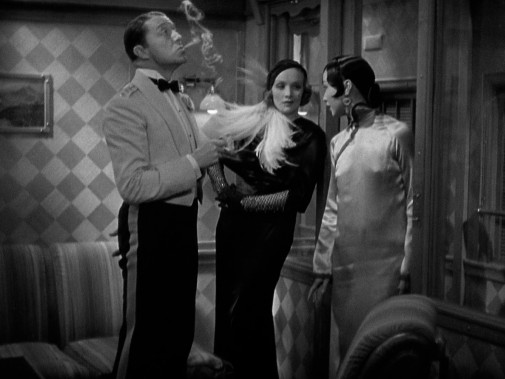
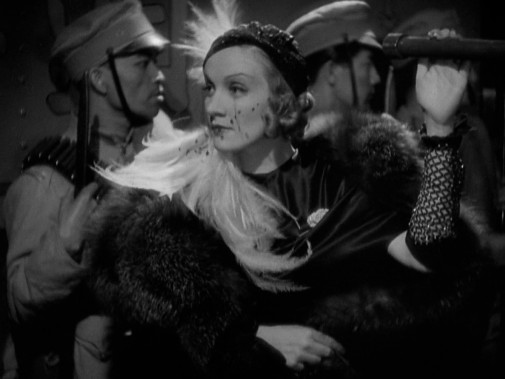
As for the comedy, there are few things funnier than how Dietrich negotiates Pre-Code innuendo. The way she fondles a gun barrel is priceless, for example. You can't get much more explicitly phallic and yet, Dietrich's performance never falls into bawdiness, always floating by on a cloud of sophisticated sexuality. Furthermore, she's playful, even when the situations drive her character to extremes. Watching her walk down a train's corridor as she prepares to seduce her target is a delight. It's a show of the jittery nerves that take hold of an actor before their time to appear on stage. Then, by the end, there's giddiness to her parody of insincere demureness. A lovely and sweet final note for Dietrich to punctuate the greatest seducer she ever played. Still, if this performance wasn't already multifaceted enough, there are great depths of feeling and even darkness to this Shanghai Lily.
Like many a Pre-Code heroine, she is an archetypal fallen woman. Nonetheless, Dietrich's Lily doesn't wear the title with shame, preferring to veil herself in eroticism instead. There's a vague sorrow to the performance but that never manifests as moral mortification. It's not exactly pride that keeps the shame away, rather an insouciant obstinance, the impetus of a diva who knows she's the most beautiful creature most people will ever see. The conclusion shows us the character's nobility without asking her to dim her light. Instead of going for beatific theatrics, Dietrich performs her character's decency while still playing her as a dazzling vixen, eliciting our respect, not inspiring pity. As much as Lily's willing to sacrifice her body and her life, Dietrich assures us that her dignity is never at stake. Even as she ponders on her fate, alone in the darkness, she's a goddess. Do her hands tremble or is the train shaking? It doesn't matter, Dietrich is always in control, she's always ravishing.
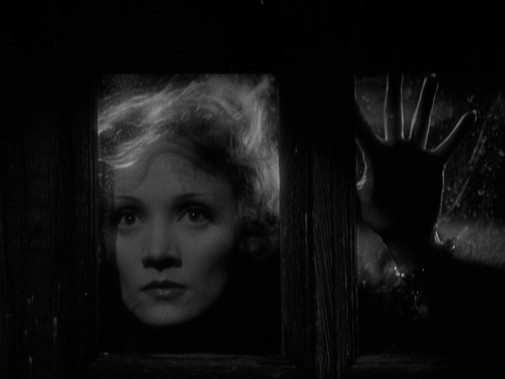
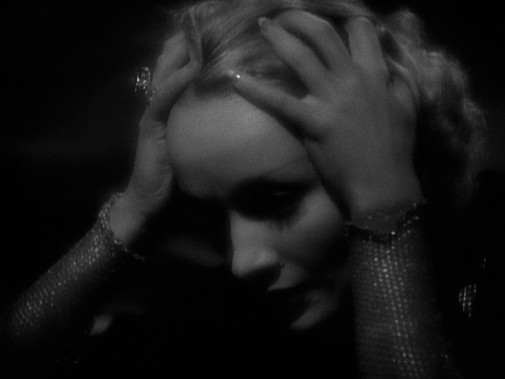
For the 5th Academy Awards, Shanghai Express received nominations for Best Picture, Director, and Cinematography, winning the latter. The movie, a smash hit at the box-office, was popular with both critics and audiences, a consequence of its intoxicating quality and the rising stardom of Dietrich. While the actress had been nominated the year before for her first Paramount movie, Morocco, she was left out of the 1932 Oscar lineup (the Oscars had not yet settled on five-wide acting categories). Instead, AMPAS honored two theater sensations, Helen Hayes in The Sin of Madelon Claudet and Lynn Fontanne in The Guardsman, as well as the Pre-Code era's unlikeliest star, Marie Dressler in Emma. Hayes would win for a variant of the fallen woman trope that isn't half as subversive as Dietrich's. If the Teutonic diva's take on the type was obstinately shameless, Hayes' approach is demonstratively moralistic. In the match of anti-sentimentalism versus sudsy melodrama, the latter won at the Oscars.
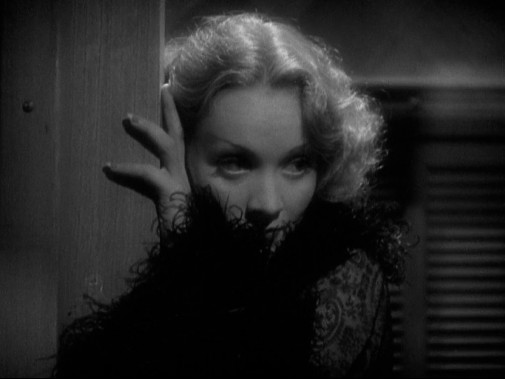
How many Oscar nominations do you think Dietrich deserved across her long Hollywood career?